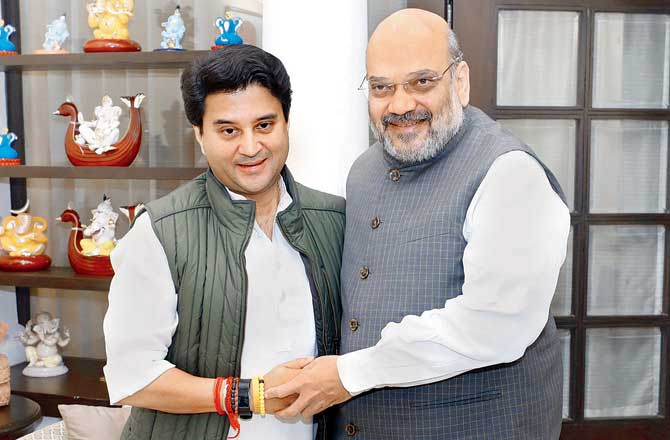Taking a cue from Scindia's switch to the BJP, experts draw inspiration from those who have been there, done that to decode whys and hows of top bosses joining competitors in the corporate world

Jyotiraditya Scindia with Congress chief Sonia Gandhi. Pics courtesy/@JM_Scindia on Twitter
When Jyotiraditya M Scindia ended his 18-year-long association with the Congress last week to join the ruling rival Bharatiya Janata Party, taking the grand old party and the nation by surprise, he said in his resignation letter, "...It is now time for me to move on...This path has been drawing out over the last year." Although his father Madhavrao was a Congress veteran, the cracks in Scindia's relation with the party had begun to appear long ago.
The Congress snubbing him as the chief ministerial candidate for the Madhya Pradesh polls in 2019 despite being one of the prominent next-gen faces, the lack of leadership in the grand old party, unfulfilled manifesto promises, and finally, no assurance over a Rajya Sabha (RS) seat, were some of the key reasons cited behind the former Member of Parliament's exit. Though he had been vocally critical of the BJP in the past, given that he was able to bag an RS nomination from the party within a day of joining, it seems that the switch was inevitable.

Scindia with Union home minister and BJP leader Amit Shah
Such deflections are common in the corporate world, too. We may think that reaching the top of an organisation may be the ultimate goal, but chief executive officers, managing directors and other members of the top brass, many of whom may have toiled for years to get to leadership positions, quit to join competitors often.
What prompts such switches, what happens once you join a rival firm, and what can companies do to retain leadership talent?
We spoke to three executive coaches to decode these questions. Here are five key takeaways.
1. Personal growth, pay, politics
One's personal career growth can't plateau after reaching the top. Mediocrity is one of the main reasons behind corporate leaders joining rival camps, says executive presence coach Vikram, who works with senior Fortune 100 leaders. As in the case of Scindia, despite good performance, if the leader is not recognised or given due credit, it leads to dissatisfaction. "Many high-potential leaders expect faster career growth. When this is denied, they may switch. Other reasons include higher pay package, lack of vision or strategy in the current company and internal politics," he adds.

Coach Vikram
2. Question your new pick
"When any employee at the senior level switches to a competitor, they bring with them core values of their former company, insight into its strategy, along with data," says Vandana Shah, founder of Chrrysallis, a corporate mentoring firm, and an executive coach. Keeping this in mind, Vikram adds that before making a switch, one should question the intention of the new firm — is it looking for your expertise or just your clients and
inside information?
3. Graceful exit
There are some restrictive clauses that some companies make their senior management members sign to avoid poaching later on. "One must be careful about what they're signing up for. You should have a fool-proof plan to skirt around the legal tangles, when you decide to join a rival firm," says Ashwin Srivastava, founder, Great Manager Institute, which provides people management training. As the leader, one should also exit gracefully to make sure the door is never closed for the future. "Be diplomatic, but also explain to them why you're leaving. Make an attempt to be in a win-win situation," advises Shah.

Vandana Shah
4. Game plan
A lot of corporate leaders end up in companies whose policies they may have criticised earlier, much like Scindia. "Take all the positive lessons you learnt to the new company, and forget and move on from negative feelings that may have existed before," says Shah. The employees in your new company are likely to look at you with doubt as you join from a rival firm. Understand how they work, build confidence among them and create your own leadership brand. "Be mindful of how you reveal sensitive information about your past clients, projects or colleagues. Your new co-workers may think you can't be trusted with sensitive information," Vikram adds.

Ashwin Srivastava
5. Companies, it's time to reflect
5With the war for talent intensifying, it will get tougher for organisations to retain good people. The priorities of leaders are also shifting from being loyal to seeking quicker growth. "There is a common perception that the CEO is the company. But they have their own set of ambitions. Boards focus on development of junior and middle management, but not on the senior leaders. Thinking of the career growth of the top leaders is critical. Boards need to take care of their needs, outside of the growth of the company," suggests Srivastava. Vikram agrees that organisations need to place the right leader in the right place. "Sometimes, it is good to let them go and hope that they will return in the future."
Learn, evaluate move on
Sandeep Gulati moved from being the chief operating officer (COO), Asia Pacific, South Africa, at StarTek Inc, an outsourcing firm, to ManpowerGroup, a workforce solutions firm, as the managing director in September 2019.

"My decision [to switch to ManpowerGroup] was based on some key questions that I asked myself. Am I relevant to the changing landscape? Am I contributing to the company as well as to myself? Am I learning? If you keep evaluating yourself, you will know when it's the right time to take the plunge," he shares.
As someone who has rotated around in different roles before reaching the top, he feels it's important to unlearn when one is making such transitions. "Both companies had one factor in common — they were people-centric. So you have to be a sponge and absorb your new eco-system. Listen to employees in your new company, respect the organisation, and then take the baton from there. Don't just sit on the top and judge others. Go with the mindset that you're being evaluated," he advises.
Catch up on all the latest Mumbai news, crime news, current affairs, and also a complete guide on Mumbai from food to things to do and events across the city here. Also download the new mid-day Android and iOS apps to get latest updates
 Subscribe today by clicking the link and stay updated with the latest news!" Click here!
Subscribe today by clicking the link and stay updated with the latest news!" Click here!







